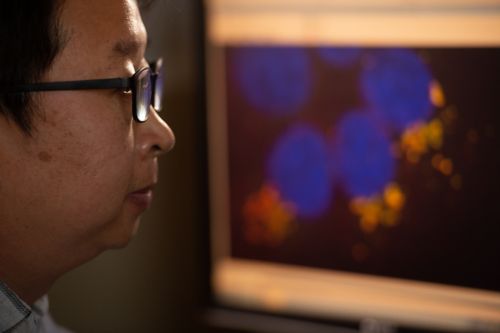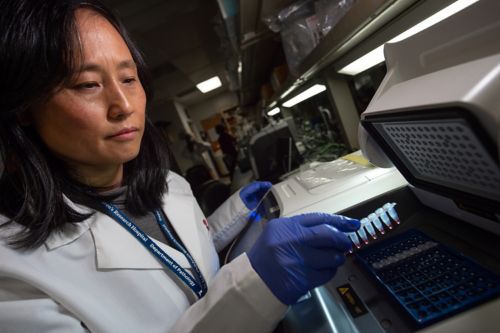St. Jude Family of Websites
Explore our cutting edge research, world-class patient care, career opportunities and more.
St. Jude Children's Research Hospital Home

- Fundraising
St. Jude Family of Websites
Explore our cutting edge research, world-class patient care, career opportunities and more.
St. Jude Children's Research Hospital Home

- Fundraising
Kundu Lab
Investigating the cellular response to metabolic stress and how dysregulation of these pathways contributes to disease
About the Kundu Lab
Coordinated cellular responses to metabolic stress are central to normal development and disease. The focus of our laboratory centers on how cells respond to metabolic and proteotoxic stress. We investigate the role of protein kinases in autophagy and stress response, and the role of somatic mitochondrial DNA mutations in cancer. A greater understanding of these cellular responses to metabolic stress will shed light on new diagnostic and therapeutic approaches for a variety of diseases.

Our research summary
Our laboratory studies the how cells respond to metabolic stress, with particular interests in the role of autophagy-related proteins in coordinating that cellular response and the impact of somatic mitochondrial DNA mutations on cancer pathogenesis and progression. We approach questions in lab at multiple levels, beginning with the whole organism and drilling down into that organism’s molecular elements.
Physiologic function of autophagy related proteins
Our work in autophagy centers on the roles of the protein kinases ULK1 and ULK2 in regulating cellular functions. Using a two-pronged approach, we look for phenotypes in ULK1/ULK2-deficient mouse models and employ proteomics to identify substrates and interacting partners for these kinases. This information gives us greater insight into the normal function of these proteins to then better understand the physiologic function as a central regulator of resource mobilization for cells.
In addition to their critical roles in autophagy, previous proteomics-based research in our laboratory led us to the seminal discovery that ULK1 and ULK2 also regulate endoplasmic reticulum (ER)-to-Golgi trafficking and may therefore coordinate the metabolic cues and protein trafficking from the ER. Armed with this knowledge and a potential target for intervention, we are using cell lines to study how and where ULK phosphorylates components of the ER-to-Golgi transport machinery and the resulting impact on ER export.
We are also investigating the role of ULK in the regulation of stress granular dynamics. Knocking out ULK1/2 in muscle leads to a phenotype similar to inclusion body myopathy (IBM), a disease that is histopathologically and functionally related to ALS and frontotemporal dementia. Using a multi-dimensional approach, we discovered that ULK1/2 targets VCP, a gene that is mutated in patients diagnosed with IBM, ALS and frontotemporal dementia.

Role of somatic mitochondrial mutations in cancer
Another major project in our laboratory centers on the role of somatic mitochondrial DNA mutations in the pathogenesis of cancer. Understanding the role of mtDNA mutations and their role in cancer pathogenesis and progression has been somewhat limited by the inability to effectively engineer these mtDNA mutations and study their effects. Up until recently, the study of mtDNA research relied largely on the generation of cybrids, a technique that involves taking the cytoplasm from one cell and fusing it with a nucleus of another.
Our laboratory has used a different approach to investigate the role of somatic mtDNA mutations in cancer. First, we use the mtDNA mutator mouse model in which genetic mutations accumulate over time as the mitochondria replicate. We isolate bone marrow from the wild type, heterozygous, and homozygous mtDNA mutator models to decipher the different burdens of mutations. From there, we introduce oncogenes and monitor tumor development to determine the role of somatic mtDNA in the development of cancer.
We are also working with computational biology experts to develop a pipeline to identify mtDNA mutations in tumor cells by documenting and characterizing the mutations that occur in various types of tumors. As part of this endeavor, we have developed new methods to identify mtDNA mutations and have shown that somatic mtDNA mutations accumulate to a significant enough level to profoundly influence the cell state.
Selected Publications
Contact us
Mondira Kundu, MD, PhD
Cell and Molecular Biology
MS343
St. Jude Children’s Research Hospital

Memphis, TN, 38105-3678 USA GET DIRECTIONS